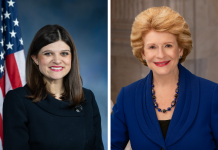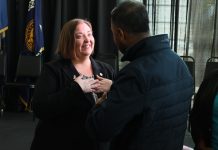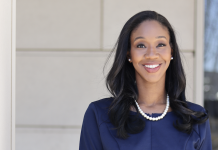
Twenty years ago, on Sept. 11, 2001, nearly 3,000 people were killed in terrorist attacks that shook and altered the foundation of the nation. To commemorate this significant anniversary of 9/11, œ„∏€¡˘∫œ≤ Õºø‚◊ ¡œ asked notable Michigan leaders to recall their thoughts and actions on that tragic day.Ã˝
John Engler
Governor, 1991-2002
“I was in the office, and my chief of staff came in and told me that a plane had crashed into the World Trade Center. Like millions, we were glued to the TV. We saw the second plane hit the other tower and immediately I knew the world was going to change. I immediately called Col. Mike Robinson, head of the Michigan State Police. That began a day of calls, consultations, and decisions without knowing the full extent of what our nation was facing. By night, our National Guard was deployed to Metro Airport and the Blue Water and Ambassador bridges. Homeland security became very real on Sept. 11, and the nation was permanently changed.”
Gretchen Whitmer
Governor, 2019-present
“I was a state legislator pregnant with my first child. I was supposed to be in Grand Rapids for a Military and Veterans Affairs Committee hearing on which I served as the minority vice chair. I never made it to that hearing. As soon as I left my house, the first plane hit the tower. As I listened to the radio and heard about the second plane, I turned my car around and drove straight to my mother’s house, who I was caring for as she underwent treatment for brain cancer. As we watched brave first responders rush to save lives, we also frantically tried to reach my sister, who lived in New York City at the time, and my father, who was in Washington for work. Both were safe, but like most Americans, I felt for days unsure what to do, how to help, who to call. As time went on, as the national fear and shock subsided, I began to feel a sense that we were all in this together. We were awestruck by the extraordinary courage of the first responders, who saved lives and inspired so many of us through their gallantry. We realized that we are stronger when we lift one another up and work together to reach a better future.”
Debbie Stabenow
U.S. senator, 2001-present
“I was less than a year into my new job representing Michigan in the U.S. Senate. I was headed to a hotel to speak at a conference near the Capitol. When I got to the hotel, I saw the second plane hit the towers live on TV and knew it wasn’t an accident. Outside, the streets were jammed with cars trying to leave the Capitol. Some drivers gave up, left their cars in the road, and started running. A few minutes later, I saw smoke rising from the other side of the Capitol. I didn’t know what had been hit. It was the Pentagon. Later that evening, senators gathered at the Capitol to show the world that even though America had been attacked, our federal government was still functioning. I got chills up my spine listening to the bipartisan Senate and House leaders speak. When they were done, Sen. Barbara Mikulski [D-Md.] began to sing ‘God Bless America.’ She urged me to join her: ‘Come on, Debbie. You can sing!’ So I did. We all did. It was a feeling of unity and solidarity that I’ll never forget.”
Debbie Dingell
U.S. representative, 2015-present; widow and successor of former Rep. John Dingell, history’s longest-serving member of Congress
‚ÄúI flew into Washington, D.C., from Michigan that morning on an early plane. Upon arrival, I learned that a plane hit the tower. Then the second plane hit. John was in the Capitol at the time. He refused to leave. Had it not been for the brave men and women on the plane that crashed in Pennsylvania, John might not have made it. To this day, I still think about the many families who lost mothers, fathers, children, grandparents, and friends. I think about the brave first responders who lost their lives and those who still live with the vivid memories of that day. I also remember the feeling of patriotism and unity that spread across the country. That unity is something we need to bring back ‚Äî and I‚Äôm hopeful we can get there.‚ÄùÃ˝
Peter Meijer
U.S. representative, 2021-present; U.S. Army Reserve, 2008-16; deployed in Iraq, 2010-11
“I was in seventh grade. The teacher let us watch the TV, as it seemed newsworthy. But when the second plane hit, the magnitude of what was happening became clear. I think we were all sent home by lunchtime. We had kids whose parents worked in aviation as pilots and flight attendants, so there was a lot of concern. I was interested in serving in the military prior to 9/11, but afterward, with the invasion of Iraq, it was more a part of our everyday life. It is a day to remember the fallen and tales of bravery and heroism. But I also hope we can have a reprise of the sense of solidarity and unity we felt as a country that day.”
Garlin Gilchrist II
Lieutenant governor, 2019-presentÃ˝
“I was a sophomore at University of Michigan and shadowing an employee at General Motors when the first plane hit. I frantically called my father, who worked at the Department of Defense, to make sure he was OK. Then I drove back to Ann Arbor in a daze. When I arrived, my dorm room was packed with roommates and friends silently watching the news as Jay-Z’s The Blueprint album played in the background. Soon, the horror and shock gave way to an overwhelming sense of care and community. Everyone leaned on one another. It was remarkable to see how in times of tragedy, our default reaction was connection instead of division. That is what I remember most from 9/11, and what I carry with me now as we emerge from another unprecedented challenge.”
Abdul El-Sayed
CNN Contributor, former Health Department director in Detroit, author and America Dissected podcast host
“I watched terrorists with names like mine attack my country in the name of my faith. The attacks devastated me. As a Muslim-American, the trauma of that day was compounded by having my names and faith targeted. When the Twin Towers fell, so did any pretense I had of ethnic anonymity; I wasn’t just another Brown kid anymore. That morning I had strutted into my public high school with the confidence it takes 16 years to develop and only a moment to take away. It was the first time I felt responsible to people who shared my identity — because it was the first time our identity had been singled out on such a broad stage.”
Dawud Walid
Executive director of the Michigan chapter of the Council on American-Islamic Relations
“The tragedy of 9/11 was doubly impactful for metro Detroit Muslims than for those of other faiths in my view. Our community experienced the FBI going door to door in Dearborn questioning Muslim residents. We saw deportations of family members and friends as a result of a government registration program which targeted men from Muslim majority countries. We have had our houses of worship infiltrated by FBI informants and have had to struggle to establish houses of worship and Islamic schools. I am proud of our community’s resiliency. We have grown in the past two decades not simply in numbers but in influence. Muslims have been elected throughout our region based upon their merits and not disqualified at the polls due to their faith. I am hopeful that despite the targeting of our community that things will continue to improve for us as long as we stay principally engaged and continue to live the beauty of our faith principles.”
Charles Eisendrath
Director of the University of Michigan Knight-Wallace Journalism Fellowships, 1986-2016
‚ÄúLike any other, the incoming class of Knight-Wallace Journalism Fellows was a distinguished group from around the country and the world who came for a year of sabbatical study.Ã˝
The main point: Encouraging reflection and time to think, rare in a journalist‚Äôs life. Then cameÃ˝thatÃ˝event. Editors including the director of BBC‚Äôs foreign staff, himself an alumnus, clamored for their stars to return to help cover the story of the century. Fellows themselves asked and begged, often assuming permission. I disagreed. If there was ever a time to demonstrate the value of absorbing history instead of reporting it, this was the ultimate teaching moment.‚Äù
David W. Coulter
Oakland County Executive
“I was at home in Ferndale when I got a call from my mom to turn on the TV. The first tower had been hit, and like everyone, I was stunned and eventually in shock and horror as the events unfolded. One of my clearest memories was how eerily quiet the skies were above my city, which were often busy from planes on a flight path to Detroit Metro Airport. At the time, I was weighing a decision to run for political office for the first time. The following year I ran for county commissioner, and I’m sure the events of that day and the resolve that I felt to help people weighed in my decision to run.”
American politics had become increasingly personal and toxic as the Twentieth Century came to a close. Cultural wedge issues had replaced partisan ideology. Both the right and left demanded unwavering orthodoxy. The diabolical attacks on Sept. 11, 2001, provided a unique opportunity for the United States to hit a reset button and begin anew without the corrosive domestic rancor. Partisans had the opportunity to be opponents without being enemies. We completely screwed it up.
Our unity in the wake of the attacks was fleeting. Instead of combatting external extremism, our internal divides intensified. The left demonized George W. Bush, John McCain, and Mitt Romney with incandescent fervor. The right did the same to John Kerry, Barrack Obama, and Hillary Clinton. We were incapable of recognizing when a true domestic extremist threat materialized in the form of Donald Trump, let alone joining together as Americans to combat him. We brought ourselves to the very brink of the cultural and political implosion Osama bin Laden and al-Qaeda failed to achieve.
Two decades after 9/11 we stand at a precipice. Our democratic republic passed a stress test last November and in the subsequent months as the very top actors in our federal and state governments, along with their propagandists, sought to set aside a free and fair election in order to maintain power. Tens of millions of Americans have become radicalized in a manner akin to adherents of el-Qaeda or ISIS. Whether our foundations hold or we topple into the abyss remains to be seen.”
Jeff Timmer
Senior advisor at The Lincoln Project, executive director of the Michigan GOP from 2005-09
“American politics had become increasingly personal and toxic as the 20th century came to a close. Cultural wedge issues had replaced partisan ideology. The diabolical attacks on Sept. 11, 2001, provided a unique opportunity for the United States to hit a reset button and begin anew without the corrosive domestic rancor. Our unity in the wake of the attacks was fleeting. Instead of combatting external extremism, our internal divides intensified. Two decades after 9/11 we stand at a precipice. Our democratic republic passed a stress test last November and in the subsequent months as the very top actors in our federal and state governments, along with their propagandists, sought to set aside a free and fair election in order to maintain power. Tens of millions of Americans have become radicalized in a manner akin to adherents of el-Qaeda or ISIS. Whether our foundations hold or we topple into the abyss remains to be seen.”
This story is featured in the September 2021 issue of œ„∏€¡˘∫œ≤ Õºø‚◊ ¡œ magazine. Read more stories inÃ˝our digital edition.Ã˝
|
| Ã˝ |
|








